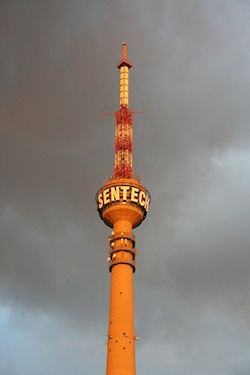
State-owned broadcast signal distributor Sentech is establishing test transmission sites in order to pilot digital terrestrial television broadcasts based on Brazilian and Japanese standards.
In an exclusive interview with TechCentral, Sentech chairman Quraysh Patel says the two countries, whose terrestrial broadcasting standards are similar, have asked to set up test broadcasts at their cost.
Sentech has agreed to the requests, but will assign its own engineers to the test sites to ensure the tests are managed by the SA company.
The tests are likely to prove contentious given the high-level opposition from commercial broadcasters to government’s decision earlier this year to reconsider the country’s commitment, made in 2006, to the European standard.
M-Net and e.tv have both expressed displeasure with communications minister Siphiwe Nyanda’s support of a review of the standard chosen.
But Patel says it’s important for SA to consider all options. “As South Africans, we should keep our doors open and our minds open, but continue along the path [of deploying the European standard] until we are proved wrong, and so far we haven’t been proved wrong,” he says.
SA agreed to the European standard, known as digital video broadcasting terrestrial, or DVB-T, with the International Telecommunication Union in 2006.
But recent lobbying by the Japanese and Brazilians has led to a probe by Southern African Development Community countries into whether DVB-T is still the most appropriate choice.
Patel says a review is not a bad thing. “We have never had a proper discussion on standards in this country,” he says.
“In order to know we are right [in having chosen the European standard], I am suggesting … we keep an open mind. I want to see whether the assertions [the Japanese and Brazilians] have made are correct.”
He says the tests will not be used to draw parallels between the Japanese and Brazilians standards and the European standard. The only valid comparison that can be made is with DVB-T2, the evolution of the European standard, and there are no immediate plans to construct a test network using the more modern version of the technology.
Patel insists the planned tests by the Japanese and Brazilians will have no bearing on the country’s roll-out of digital terrestrial television transmitters that use DVB-T — at least not yet.
“We are not trying to do comparisons with DVB-T,” he says. “All they are trying to do is show us their standards work.”
He insists Sentech needs to be a “polite host” but says the foreign parties will not have free access to the company’s transmitters. “They are not going to go out and take control of a [broadcast] tower. We will set the parameters.”
If anything, SA still appears far from abandoning its commitment to the European standard, Patel says.
Nyanda has instructed Sentech to step up the pace of roll-out of the DVB-T network.
Sentech currently covers 33% of television households with a digital signal, and Nyanda wants it to reach 60% by March 2011. The company has approached national treasury for funds to expand the network.
The Japanese and Brazilians tests won’t prove conclusive, Patel says. “Ultimately, we are just a technology company. We can only make information available to government. If there is going to be a proper standards review done, Sentech would like to be involved because we will have test results that we can share.”
Patel says there has been no political pressure on Sentech to conduct the Brazilian and Japanese tests, insisting he took the decision of his own accord.
“I just want to be open and have the opportunity of talking to different people,” Patel says. “We are committed to DVB-T, it’s a cabinet decision, it’s in my budget, it’s in my business plan, and I want to achieve 60% coverage by March next year.” — Duncan McLeod, TechCentral
- Subscribe to our free daily newsletter
- Follow us on Twitter or on Facebook

